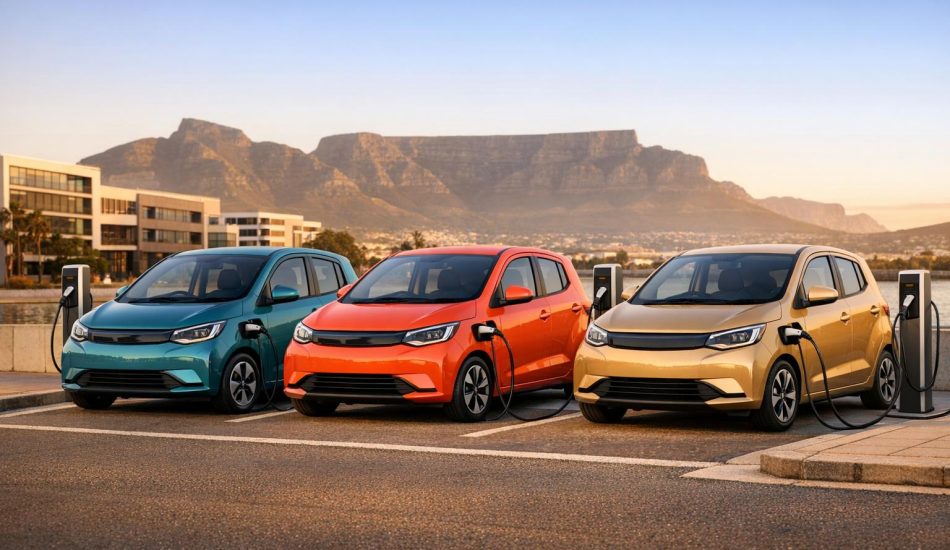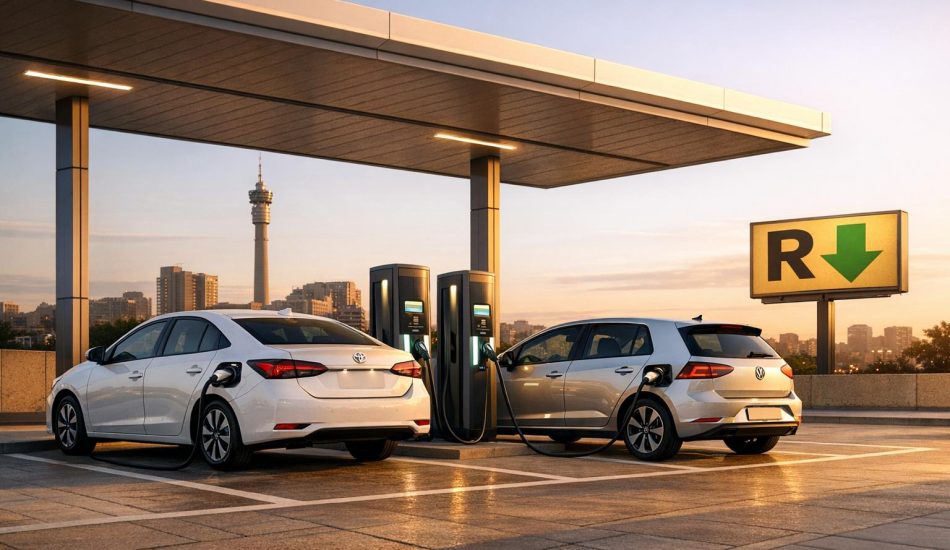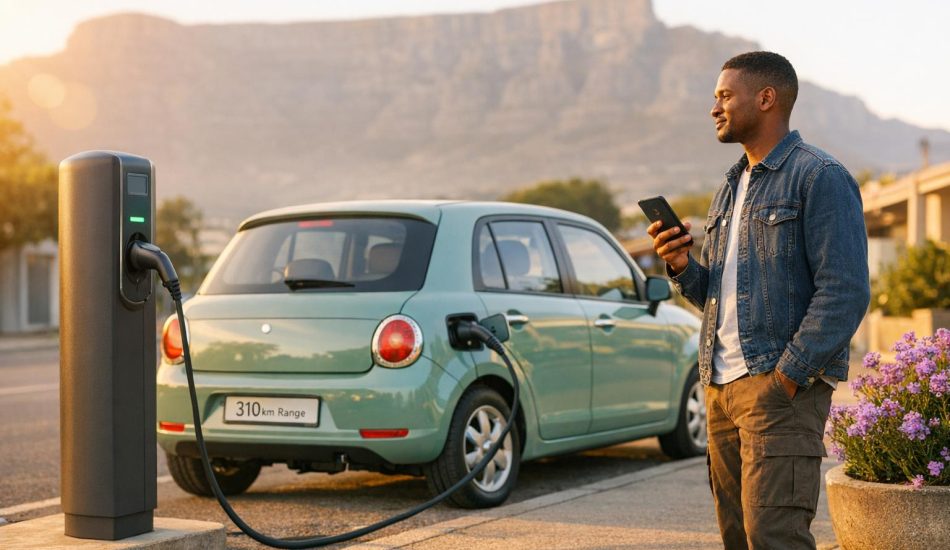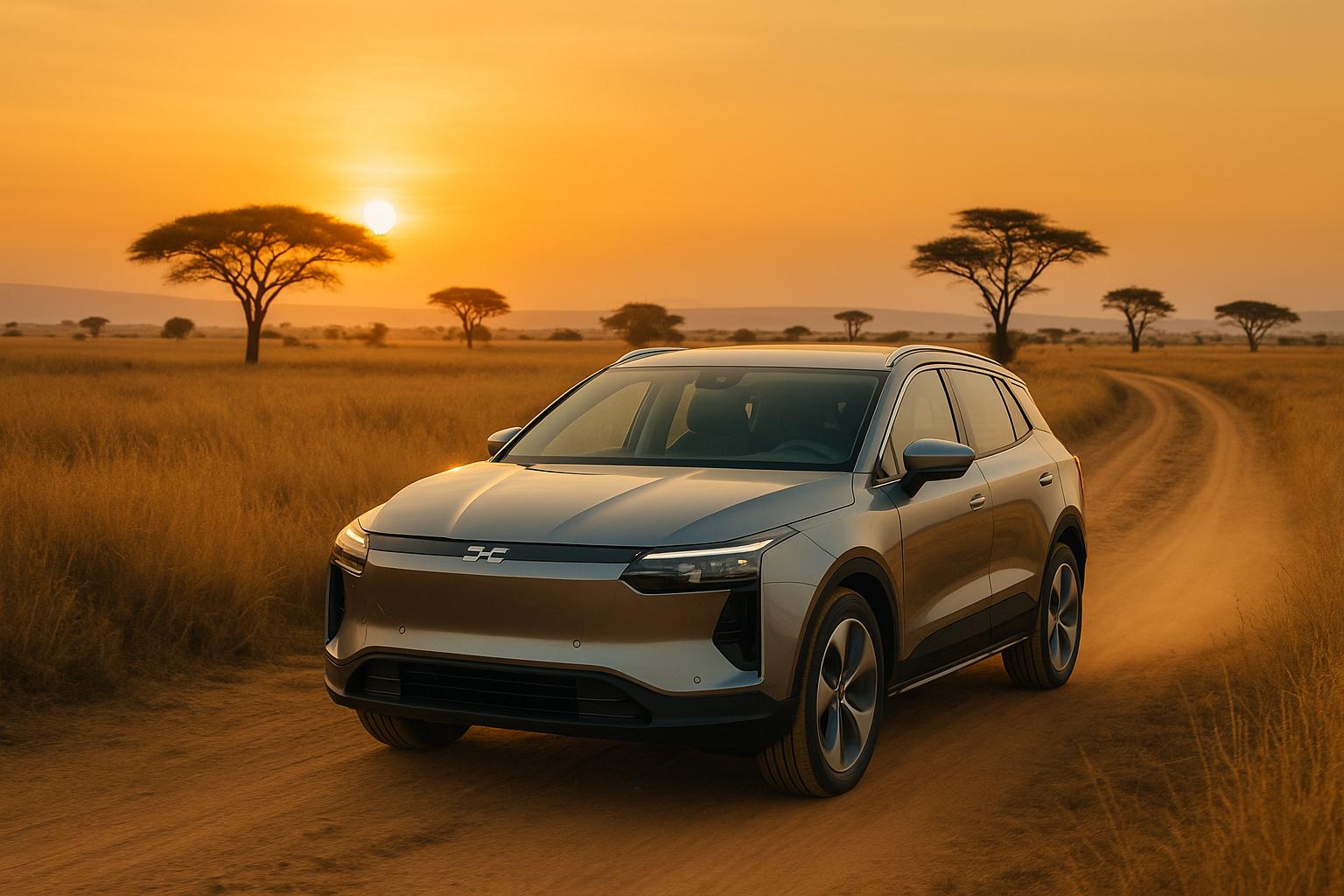
Looking to buy an electric SUV in Africa? The Aiways U5 could be a solid choice, offering electric mobility tailored for diverse African roads. Here’s what you need to know before making a decision:
- Performance: The U5 handles varied terrains, from city streets to rough rural roads, with a robust battery system and smooth torque for climbs and overtaking.
- Charging: It supports fast charging (10%-80% in ~34 minutes) and home charging options, but charging infrastructure varies by region.
- Comfort: Spacious interior, adjustable seating, and energy-efficient climate control make it practical for families and businesses.
- Safety & Tech: Features like adaptive cruise control, lane warnings, and over-the-air updates ensure convenience and security.
- Cost: Pricing depends on your country’s import taxes. For example, Kenya offers favorable EV tax exemptions, while South Africa imposes higher taxes.
Key Considerations: Availability of charging stations, local service networks, and import regulations significantly impact ownership. The U5 is ideal for those ready to plan around these factors and embrace electric driving.
Read on for a detailed breakdown of features, pricing, and ownership tips.
10 Surprisingly Good Chinese Electric SUVs to Receive International Acclaim in 2022
Aiways Electric SUV Features
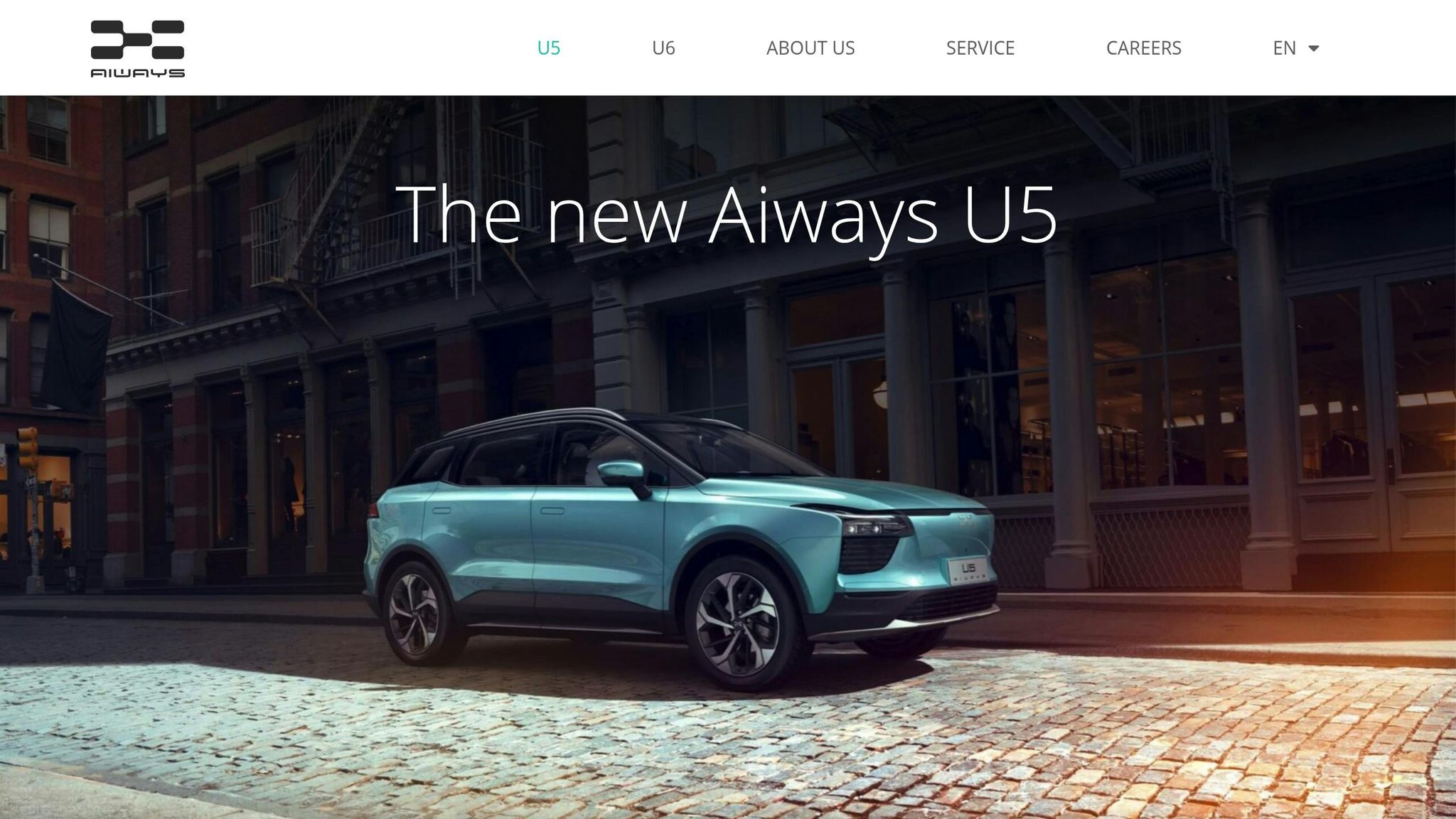
Built with African roads in mind, the U5 is designed to combine efficiency with dependable durability. It’s tailored to handle the challenges of diverse terrains while offering modern conveniences and reliable performance.
Battery, Range, and Power
The U5’s high-capacity lithium-ion battery provides an excellent range, making it suitable for daily commutes and longer journeys alike.
Its single electric motor ensures smooth acceleration and delivers enough power to tackle highways and off-road routes. The responsive torque is particularly handy for steep climbs and quick overtaking.
Charging is designed to fit your lifestyle. Fast-charging options minimize downtime, while standard charging is perfect for overnight use. A smart battery management system keeps performance steady, even in varying temperatures.
This solid performance paves the way for a comfortable and efficient driving experience.
Interior Space and Comfort
Step inside the U5, and you’ll find a roomy, practical cabin made with durable, low-maintenance materials.
Seating is thoughtfully designed for comfort, offering adjustable configurations and ample legroom for passengers in both the front and rear. The generous cargo space is versatile enough to accommodate family trips, business needs, or everyday errands.
An energy-efficient climate control system ensures a comfortable interior without draining the battery.
Modern technology is seamlessly integrated into the interior, enhancing the overall experience.
Technology and Safety Features
The U5 is packed with modern tech, including a sleek touchscreen infotainment system that supports smartphone connectivity and navigation, keeping drivers connected and informed on the go.
Safety is a priority, with features like adaptive cruise control, lane departure warnings, and automatic emergency braking. A full suite of airbags and advanced stability controls adds an extra layer of security, making the U5 a reliable choice for all types of road conditions.
With over-the-air updates and remote monitoring, drivers can stay updated on battery levels and locate nearby charging stations with ease. Reinforced construction further enhances the U5’s durability, ensuring it can handle rough or uneven roads with confidence.
Performance on African Roads
The U5 is built to handle the unique challenges of driving across Africa’s varied landscapes. Whether you’re cruising on high-speed highways or tackling rugged rural roads, this vehicle offers dependable performance tailored to these environments.
Climate and Terrain Performance
Africa’s extreme climates and terrains demand a vehicle that’s up to the task, and the U5 delivers. Its thermal management system keeps the battery and motor operating efficiently, even in scorching heat. Dusty or unpaved roads are less of a concern thanks to features designed to minimize the impact of dust and debris. With its generous ground clearance and durable underbody protection, the U5 easily navigates uneven surfaces. Additionally, its design helps resist moisture and corrosion, making it well-suited for humid coastal and equatorial areas.
Towing and Load Capacity
The U5 is more than capable when it comes to towing small trailers or carrying light equipment, making it a practical choice for both work and family outings. The roof is built to accommodate accessories like luggage racks, camping gear, or even solar panels. Inside, the spacious cargo area becomes even more versatile with rear seats that fold down, allowing you to transport larger items with ease. The vehicle’s systems also adapt to varying payloads, ensuring steady performance no matter the load. This adaptability is especially valuable for Africa’s unpredictable road conditions.
Range and Charging Challenges
The U5’s range can fluctuate based on factors like terrain and climate control usage. For instance, running the air conditioning in high heat or driving on hilly terrain may reduce efficiency. However, in urban settings, regenerative braking during stop-and-go traffic helps reclaim energy. In areas where charging infrastructure is still growing, careful planning becomes essential. The U5’s navigation system simplifies this by pinpointing nearby charging stations. Plus, the ability to charge using standard household outlets adds convenience in places where dedicated stations are limited. These features play a key role in managing overall ownership costs.
sbb-itb-99e19e3
Pricing and Ownership Costs
Owning the Aiways U5 in Africa involves more than just the sticker price. Import duties, taxes, insurance, and maintenance all play a significant role in determining the total cost of ownership.
Pricing Across African Markets
The price of the Aiways U5 varies widely across African countries due to differing tax policies and import regulations. For instance, Kenya stands out as one of the most EV-friendly markets on the continent. Here, fully electric vehicles are exempt from import duties. For a U5 with a customs value of around $9,500 (KES 700,000), Kenyan buyers face additional taxes totaling approximately $3,140 (KES 231,700). These include a 10% excise duty, 16% VAT on the combined customs value and excise, and fees such as the Import Declaration Fee and Railway Development Levy.
In contrast, South Africa imposes a steep 25% import tax on electric vehicles, which is notably higher than the 18% charged for gasoline-powered cars. For luxury EVs priced above $50,000, an additional ad valorem tax of up to 30% is applied. Dr. Norman Lamprecht of the Automotive Industry Export Council highlights this burden, stating:
"The tax burden on consumers purchasing vehicles is huge".
| Kenya EV Import Tax Breakdown (2024–2025) | Rate | Basis | Estimated Amount (KES) for CIF 700,000 |
|---|---|---|---|
| Import Duty | 0% | CIF | 0 |
| Excise Duty | 10% | CIF | 70,000 |
| VAT | 16% | CIF + Excise Duty | 123,200 |
| IDF (Import Declaration Fee) | 3.5% | CIF | 24,500 |
| RDL (Railway Development Levy) | 2% | CIF | 14,000 |
| Total Estimated Taxes | 231,700 |
These differences in tax structures make it essential to evaluate both the upfront costs and the financial implications of purchasing an EV in your specific market.
Availability and Delivery Options
Beyond pricing, delivery logistics also play a key role in the buying process. The Aiways U5 is distributed to African markets through several channels, with Jinzhou Automobile Co., Ltd – a FOTON Group subsidiary – acting as a major supplier. This company exports to over 80 countries, including Tanzania, Zambia, Nigeria, Ethiopia, Sudan, and Congo.
Direct imports typically take 15–30 days, though seasonal demand can sometimes extend these timelines. While the supplier manages most logistics, buyers are often responsible for clearing customs and arranging final delivery locally.
For a more seamless experience, platforms like EV24.africa offer door-to-door delivery services across all 54 African countries. Though delivery through such services can take 4 to 8 weeks, they handle customs clearance, registration, and local delivery coordination, simplifying the entire process.
Financing options vary by region. Some markets provide traditional auto loans tailored for EVs, while others offer lease-to-own programs, making the transition to electric vehicles more accessible.
Cost of Ownership
Once the vehicle is delivered, understanding the recurring costs is crucial for assessing its long-term affordability. While the Aiways U5 may come with higher upfront expenses, its long-term ownership costs are generally lower compared to traditional vehicles.
In Kenya, additional yearly costs include registration fees of $135–270 (KES 10,000–20,000) and insurance premiums ranging from $405–675 (KES 30,000–50,000). Initial import-related fees, such as clearing agent and port charges, add another $810–1,080 (KES 60,000–80,000) in the first year.
Maintenance costs are typically lower for electric vehicles since they have fewer moving parts. However, the availability of replacement parts can be a challenge, especially in regions outside major cities. Buyers should plan for potential delays when sourcing components.
These factors highlight the importance of a well-thought-out financial plan when transitioning to electric mobility in Africa. From upfront costs to ongoing expenses, understanding the full picture is key to making an informed decision.
Buying Considerations
Before purchasing an Aiways electric SUV, it’s important to evaluate your charging options and understand the import requirements to ensure it fits your needs.
Charging Infrastructure and Compatibility
The Aiways U5 is built to align with widely used charging standards, making it relatively straightforward to integrate into existing charging networks. It supports Type 2 AC charging and CCS DC fast charging. For home or public AC charging, the U5 can charge up to 11 kW using a Type 2 connector, taking approximately 6.5 hours for a full charge. On the other hand, if you’re in a hurry, the CCS DC fast charging option can take the battery from 10% to 80% in just 34 minutes at a maximum of 92 kW.
To add to its convenience, the charging port is positioned on the front side-left of the vehicle, making it easy to access. These features make the U5 a practical choice for drivers who want flexibility in their charging options.
Import Regulations and Incentives
Importing an electric vehicle like the Aiways U5 comes with its own set of challenges and opportunities, especially across various African markets. Regulations, duties, and incentives can differ significantly depending on the country. To avoid surprises, it’s wise to consult local authorities or a trusted dealer to get clarity on import duties, required documentation, and any available incentives in your area. This preparation will give you a better understanding of the overall cost and process involved in owning the vehicle. These factors can greatly influence the long-term affordability and practicality of the U5 in your region.
Pros and Cons
When making a decision, it’s helpful to weigh the benefits and drawbacks of the Aiways U5. Here’s a quick overview:
| Pros | Cons |
|---|---|
| Lower operating costs | Import regulations and incentives vary |
| Environmental benefits | Limited service network availability |
| Quiet and smooth operation | |
| Advanced technology and safety features | |
| Reduced maintenance requirements | |
| Enhanced energy independence |
Your driving habits, location, and specific needs should ultimately guide your choice when considering an Aiways electric SUV. Balancing these factors can help you decide if the U5 is the right fit for you.
Conclusion
The Aiways U5 electric SUV presents an intriguing option for Africa’s emerging EV market. Its design focuses on meeting practical needs, such as dependable performance, charging convenience, and a comfortable interior – key factors for potential buyers.
That said, it’s essential to evaluate a few critical aspects before committing. Local service networks, import regulations, and the availability of charging infrastructure can significantly influence the overall ownership experience. These factors vary widely across regions and could impact the U5’s practicality for everyday use.
With its thoughtful features and ability to adapt to diverse conditions, the U5 holds promise in a market navigating changing regulations and the gradual expansion of charging networks. When paired with accessible charging solutions and a clear understanding of local requirements, this SUV could provide both economic savings and environmental advantages over the long term.
As Africa’s EV market continues to grow, the Aiways U5 positions itself as a vehicle that could help drive the region toward a more sustainable future.
FAQs
What challenges might you face owning an Aiways U5 electric SUV in Africa, and how can they be resolved?
Owning an Aiways U5 electric SUV in Africa presents a few hurdles. Among the most pressing are limited charging infrastructure, unreliable power grids, and high import taxes. Together, these factors can drive up costs and make owning an EV less convenient in certain regions.
However, there are ways to tackle these challenges. Governments can play a key role by expanding charging networks, introducing tax incentives, and supporting local EV manufacturing to bring down prices. Solar-powered charging stations also offer a smart solution for addressing unreliable power grids, making the U5 a more practical choice for African drivers.
What should I know about the charging infrastructure for the Aiways U5 in different African countries?
Charging infrastructure for electric vehicles, such as the Aiways U5, can differ widely across African nations. Urban areas are beginning to develop EV charging networks, but in many regions, options might still be limited. It’s a good idea to look into the charging solutions available in your area, including public charging stations and at-home setups.
Charging times and costs will depend on the type of charger you use – whether it’s a standard charger or a faster alternative. If you’re thinking about the Aiways U5, make sure the local infrastructure aligns with your driving habits, especially for longer journeys where accessible charging points are essential.
What should buyers know about import taxes and regulations for electric vehicles in Africa?
Import taxes and rules for electric vehicles (EVs) differ greatly across Africa, depending on the country. Take South Africa, for instance: it imposes a 25% import duty on EVs, which is the same as for traditional vehicles. However, some European imports might qualify for reduced rates. Nigeria, on the other hand, exempts EVs from VAT and import adjustment taxes, but buyers still face a 15% NAC Levy and 10–20% import duties. In contrast, countries like Ghana and Malawi have taken steps to cut or waive import duties, especially to encourage EV use in public transportation.
For anyone considering an EV purchase, it’s crucial to dig into the specific policies in their country. Some governments provide incentives or exemptions to make the shift to electric vehicles more appealing. These regulations can play a big role in determining the cost and practicality of bringing an EV into the market.


